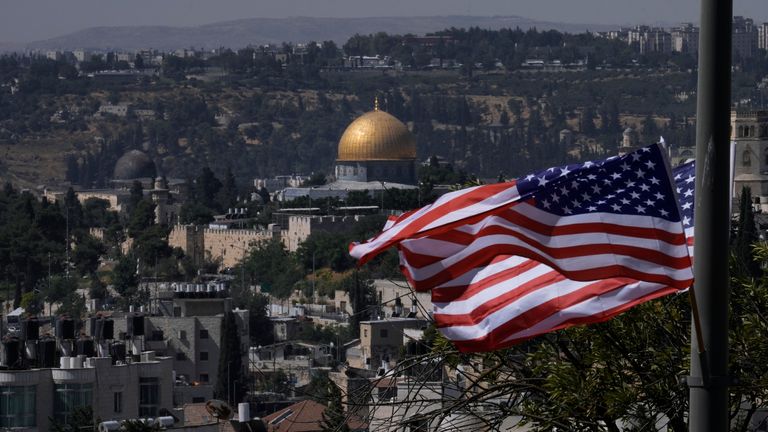President Joe Biden will arrive in the Middle East later today for his first trip to the region since joining the White House.
Mr. Biden, who will be accompanied by Secretary of State Blinken and other officials, will land at Israeli Ben Gurion Airport on Wednesday afternoon to begin a three-day visit to Israel and the West Bank before moving on to Saudi Arabia at the end of the week.
Expectations have been mitigated in recent days after reports that the visit could be an opportunity to officially announce the improvement of relations between Israel and Saudi Arabia and a regional defense pact; Instead, a series of lower-level announcements are expected to signal closer ties in the region, building on the 2020 Abraham Accords.
Likewise, Palestinian hopes that Biden will honor his election manifesto and reopen a US embassy in East Jerusalem are unlikely.
However, Yair Lapid, Israel’s new interim prime minister, has just revealed a series of measures that appear to be designed to please the US delegation, including the legalization of the status of 5,500 undocumented Palestinians living in Gaza and the West Bank and the approval of a small number of Palestinian housing projects.
Unlike past US presidents, most of whom have arrived in the Holy Land with big promises of peace deals, or pledges to resolve the two-state solution, Biden’s 48 hours will be short and devoid of big headlines.
He will hold meetings with Israeli politicians in West Jerusalem on Thursday, before meeting with the Palestinian leadership in East Jerusalem on Friday.
The president of the United States will also travel to Bethlehem in the West Bank to visit the Church of the Nativity, which is said to be the birthplace of Jesus.
Iran will be near or top of the agenda when leaders meet, with Israel pushing the growing threat from Tehran and its delegates, while the United States is eager to save hopes of a new nuclear deal.
Follow the daily podcast on Apple Podcasts, Google Podcasts, Spotify, Spreaker
For much of his presidency, Biden paid less attention to the Middle East than his predecessors, preferring instead to focus on China and, more recently, the conflict in Ukraine.
This is due to a number of reasons: having become an oil exporter itself, the US is less dependent on Gulf energy reserves, the administration is also aware of the negative effects of US military interventions in the region, and Mr. Biden has been reluctant. to be drawn into the Israeli-Palestinian conflict.
So why visit now? The timing is certainly not ideal: Israel has an interim prime minister and will face new elections by the end of the year, and Palestinian leader Mahmoud Abbas has seen his authority erode in the West Bank in recent months, both situations leaving. the prospect of a two-state solution unthinkable for now.
But the US is wary of Russia and China putting themselves in its shoes in the region, and the war in Ukraine has also changed US calculations.
In 2018, just four years ago, Biden described Saudi Crown Prince Mohammed bin Salman as a “pariah” after the murder of Saudi journalist Jamal Khashoggi.
Biden’s visit to the kingdom has already received sharp criticism, but he will go to Jeddah to push the Saudis to increase oil production to alleviate a global energy crisis caused by the Russian invasion of Ukraine and the ensuing sanctions.
The eight-year war in Yemen will also be on Biden’s agenda when he visits the Saudi coastal city of Jeddah for talks with King Salman and Crown Prince Mohammed bin Salman.
A difficult truce looms over the world’s worst humanitarian crisis and Biden hopes to persuade Saudi Arabia to make it permanent.
But the oil crisis, following the Russian invasion of Ukraine, will be at the center of discussions, with the US hoping to persuade the Saudis to increase production in order to lower global costs.
Biden may have tried to keep his distance, but no US president can ignore the Middle East and, like his predecessors, the 46th president finds himself drawn into the region whether he likes it or not.

